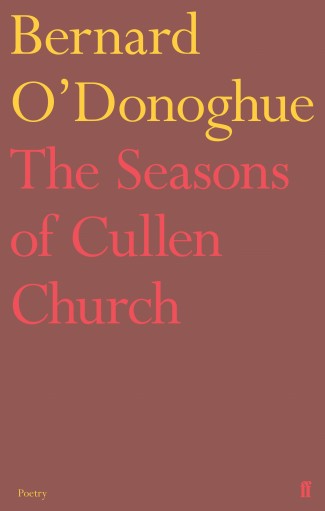Bernard O’Donoghue says it is difficult to name a poetry book, because most are made up of ‘bits and pieces’. The Seasons of Cullen Church is apt. It evokes both the passage of time and the intense attention to location found in O’Donoghue’s work. Previous collections have also taken place and time as titular concerns and the book finds foreshadows, too, of its strong elegiac themes.
It is indicative of the richness of life in his childhood home of Cullen, and of O’Donoghue’s skill as an archaeologist, that he can still unearth so much from a place he left as a teenager. He returns, or tries to return, over and over. The title poem speaks of émigrés, priests, ‘returned / from California, Manchester or the Far East.’ In ‘Evacuee’ it is the poet’s ‘Manchester mother’ who yearns to go back across the Irish Sea. However, there is also a sense of displacement and isolation. We find it in ‘Connolly’s Bookshop’, with Robinson Crusoe afloat on a sea of books, and in ‘Underfoot’, with its reference to Man Friday. And any frequent traveller will recognise the dislocation in ‘First Night There’.
Quiet devastations abound. There are no ‘ta-daa’ moments – O’Donoghue prefers a gentle reveal of the complexity of lives that are, like fractals, more intricate the closer we look at them. In ‘Specific Gravity’ a brief meditation on science breaks into elegy as a man on a mountaintop hopes that the ‘sea wind / might drain all trace of fluid from the eyes’. ‘The Din Beags’ tells of the macabre burial of a horse in frozen ground. And ‘The Thaw’ inverts a familiar motif to seek a return to ‘human cold… packed in ice’ to preserve a relationship.
There is an ever-present sense of loss. The Seasons closes with a snippet of translation to acknowledge a loss that is public, professional and, perhaps for O’Donoghue, also personal. In ‘The Boat’, for Seamus Heaney, O’Donoghue recalls that the righteous man is ‘safe and sound / as long as he stays within the boat’s timbers.’ The poem is not showy but showcases what the dedicatee once described as the ‘craft’ and ‘technique’ of the poet. The metre and line breaks rock us down the page. But any attempt to rush will see the reader stumble. The poem is a reminder that balance is dynamic, that to be upright we must not be still, but in steady motion.
In ‘From Piers Plowman’ – an earlier translation from the poem behind ‘The Boat’ – O’Donoghue vaunts ‘the magical world / That I haven’t the time or the skill to describe’. But it is not so. Although O’Donoghue revels in the ordinary he also offers the extraordinary. There is the majestic beauty, most of all in ‘Swifts’, in which the poet recalls
the shearwaters who were all around us
one mystic Skellig midnight, souls returned
from their other, closed life deep out at sea.
The near-mythological imagery of this island, and the religious overtones of several of the poems, bridge any thematic gap between ordinary life in Cullen and the extraordinary found in the collection’s translations from Dante and Virgil.
The late Geoffrey Hill wrote that a poem ought to be a ‘sad and angry consolation’. If there is anger in O’Donoghue’s poetry, then it is a quiet one, a defiance of any temptation to be impulsive in the face of our losses. ‘The Boat’ can be read as a reflection on the life of the poet. This was a preoccupation of the dedicatee and can also be found elsewhere in The Seasons in ‘You Know the Way’. In a Frostian equivocation over the path chosen the poet wonders ‘how far the decision will take you from the straight and narrow’. Elsewhere, in ‘Stigma’, the poet quizzes his preoccupation with ‘Con’s shaky bike’ in Cullen amidst the ‘poverties of our present time’. Perhaps these returns to home ground keep O’Donoghue within the boat’s timbers – safe from the stormier waters of current affairs.
But for all the loss and self-doubt here there is also consolation. O’Donoghue connects the present to what has gone before to remind us that seasons return. It is his particular gift to do so with images of humanity at its most plain and in a poetry that sits amongst the gentlest music of Ireland’s lyrical tradition. These poems, and the consolation they offer, are therefore vital, both because of their necessity, and because they concern themselves with the very essence of life.
Cian Murphy is from Cork and lives in London where he teaches at university. Envoi will publish his poetry in October of this year.

